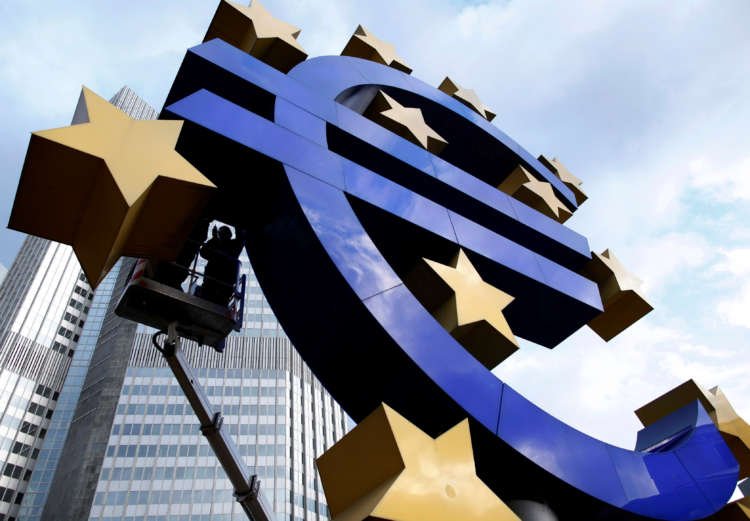ECB faces tricky balancing act after pandemic debt surge
Published by linker 5
Posted on February 19, 2021
5 min readLast updated: January 21, 2026

Published by linker 5
Posted on February 19, 2021
5 min readLast updated: January 21, 2026

By Francesco Canepa, Frank Siebelt and Balazs Koranyi
FRANKFURT (Reuters) – As the euro zone begins to emerge from the depths of a pandemic-induced recession, the European Central Bank is facing a difficult balancing act between supporting indebted governments and keeping creditors onside.
Encouraged by the ECB-POLICY-KAZIMIR-00b06d9b-4b99-46ce-a2aa-458d8eb2d993>ECB-POLICY-CENTENO-a52f21b9-8975-4dc5-9a21-8c5e8267aa43>ECB-POLICY-KAZIMIR-00b06d9b-4b99-46ce-a2aa-458d8eb2d993>ECB’s massive bond purchase programme and ultra-low interest rates, national governments have taken on a mountain of new borrowing to cushion the coronavirus pandemic, pushing total public debt to 102% of the region’s output.
With a euro zone recovery seen lagging that of the United States or Asia, these countries will not grow their way out of debt or see it eroded away by rising prices any time soon.
Yet Bundesbank President Jens Weidmann has made clear he expects monetary policy to return to normal once inflation returns.
That means President Christine Lagarde and her colleagues must strike a difficult balance between the need to keep credit sufficiently easy for weaker borrowers like Italy while not losing the support of creditor countries.
“I think the ECB-POLICY-KAZIMIR-00b06d9b-4b99-46ce-a2aa-458d8eb2d993>ECB-POLICY-CENTENO-a52f21b9-8975-4dc5-9a21-8c5e8267aa43>ECB-POLICY-KAZIMIR-00b06d9b-4b99-46ce-a2aa-458d8eb2d993>ECB is trapped,” said Friedrich Heinemann, a professor at Germany’s ZEW institute.
“Certain heavily indebted countries can no longer cope on their own. The big issue here is the Italian debt,” he said of Rome’s 154% debt/GDP level.
ECB-POLICY-KAZIMIR-00b06d9b-4b99-46ce-a2aa-458d8eb2d993>ECB-POLICY-CENTENO-a52f21b9-8975-4dc5-9a21-8c5e8267aa43>ECB-POLICY-KAZIMIR-00b06d9b-4b99-46ce-a2aa-458d8eb2d993>ECB chief economist Philip Lane has rejected the idea that the bank’s policy is constrained, saying in a Reuters interview last year he was confident the bank could exit its bond-buying programmes when inflation allowed it to do so.
This is unlikely to happen any time soon.
JAPANESE WAY
The ECB-POLICY-KAZIMIR-00b06d9b-4b99-46ce-a2aa-458d8eb2d993>ECB-POLICY-CENTENO-a52f21b9-8975-4dc5-9a21-8c5e8267aa43>ECB-POLICY-KAZIMIR-00b06d9b-4b99-46ce-a2aa-458d8eb2d993>ECB has been already buying government bonds for six years, trying but largely failing to generate enough activity to achieve its near-two-percent inflation target.
Notwithstanding an expected rebound in euro area prices this year due to one-off factors and speculation of reflation in the United States, there is no sign of a stable return to higher levels of inflation on this side of the Atlantic.
This is due to both the aftermath of the pandemic, which destroyed millions of jobs, and structural factors keeping a lid on prices such as an ageing population, relentless technological progress and globally competitive product markets.
Even if inflation were to reach 2%, Lagarde could argue that it should be allowed to overshoot for some time after lagging below target for over a decade.
This argument, borrowed by the Federal Reserve, is being discussed as part of an ongoing review of the ECB-POLICY-KAZIMIR-00b06d9b-4b99-46ce-a2aa-458d8eb2d993>ECB-POLICY-CENTENO-a52f21b9-8975-4dc5-9a21-8c5e8267aa43>ECB-POLICY-KAZIMIR-00b06d9b-4b99-46ce-a2aa-458d8eb2d993>ECB’s policy strategy.
That should give Lagarde a justification to keep rates low and perhaps even continue buying bonds for a long time, like the Bank of Japan has been doing.
“It’s the Japanese way of handling the problem,” Philipp Vorndran, a strategist at fund management firm Flossbach von Storch, said. “A state can work at zero interest for eternity if people don’t lose trust in money.”
Graphic: Italy’s debt to GDP ratio

BUYING BONDS
The ECB-POLICY-KAZIMIR-00b06d9b-4b99-46ce-a2aa-458d8eb2d993>ECB-POLICY-CENTENO-a52f21b9-8975-4dc5-9a21-8c5e8267aa43>ECB-POLICY-KAZIMIR-00b06d9b-4b99-46ce-a2aa-458d8eb2d993>ECB has bought 3 trillion euros worth of government debt and it has pledged to keep at it until the coronavirus crisis is over and replace maturing bonds for even longer.
For now, Lagarde is free of some of the problems that dogged her predecessor, notably a lengthy court dispute with German sceptics about the legality of bond purchases that has been put to bed following a constitutional ruling last May.
The European Union is finally progressing on fiscal matters, issuing for the first time substantial amounts of joint debt to finance a 750-billion-euro pandemic recovery fund – giving the ECB-POLICY-KAZIMIR-00b06d9b-4b99-46ce-a2aa-458d8eb2d993>ECB-POLICY-CENTENO-a52f21b9-8975-4dc5-9a21-8c5e8267aa43>ECB-POLICY-KAZIMIR-00b06d9b-4b99-46ce-a2aa-458d8eb2d993>ECB more scope for bond purchases and alleviating pressure on some of the weaker members of the bloc.
Former Italian Economy Minister Roberto Gualtieri had already committed to bringing Italy’s debt ratio back down to 2019 levels by 2030 through growth and investment, while the appointment of ex-ECB-POLICY-KAZIMIR-00b06d9b-4b99-46ce-a2aa-458d8eb2d993>ECB-POLICY-CENTENO-a52f21b9-8975-4dc5-9a21-8c5e8267aa43>ECB-POLICY-KAZIMIR-00b06d9b-4b99-46ce-a2aa-458d8eb2d993>ECB boss Mario Draghi as prime minister is fuelling investor hopes for growth-friendly reforms.
It is too early to tell whether the euro zone’s rising debt mountain will become a theme for conservatives in Germany’s federal election this September – but for now, coalition sources say they are steering clear of any debate around ECB-POLICY-KAZIMIR-00b06d9b-4b99-46ce-a2aa-458d8eb2d993>ECB-POLICY-CENTENO-a52f21b9-8975-4dc5-9a21-8c5e8267aa43>ECB-POLICY-KAZIMIR-00b06d9b-4b99-46ce-a2aa-458d8eb2d993>ECB policy.
But she still has some convincing to do.
Beyond Weidmann and fellow hawks on the ECB-POLICY-KAZIMIR-00b06d9b-4b99-46ce-a2aa-458d8eb2d993>ECB-POLICY-CENTENO-a52f21b9-8975-4dc5-9a21-8c5e8267aa43>ECB-POLICY-KAZIMIR-00b06d9b-4b99-46ce-a2aa-458d8eb2d993>ECB’s Governing Council, low rates have infuriated savers, who have seen the returns on fixed income investments disappear and property prices skyrocket in some areas.
Ironically, inflated assets prices make it even more difficult for the ECB-POLICY-KAZIMIR-00b06d9b-4b99-46ce-a2aa-458d8eb2d993>ECB-POLICY-CENTENO-a52f21b9-8975-4dc5-9a21-8c5e8267aa43>ECB-POLICY-KAZIMIR-00b06d9b-4b99-46ce-a2aa-458d8eb2d993>ECB to tighten policy if needed as that would likely trigger an economically disruptive market rout.
This and the unspoken need to help governments roll over their debt, known in academic parlance as “fiscal dominance”, meant the ECB-POLICY-KAZIMIR-00b06d9b-4b99-46ce-a2aa-458d8eb2d993>ECB-POLICY-CENTENO-a52f21b9-8975-4dc5-9a21-8c5e8267aa43>ECB-POLICY-KAZIMIR-00b06d9b-4b99-46ce-a2aa-458d8eb2d993>ECB was seen as having little choice but to keep the money taps open for the foreseeable future.
“What constrains the ability of the ECB-POLICY-KAZIMIR-00b06d9b-4b99-46ce-a2aa-458d8eb2d993>ECB-POLICY-CENTENO-a52f21b9-8975-4dc5-9a21-8c5e8267aa43>ECB-POLICY-KAZIMIR-00b06d9b-4b99-46ce-a2aa-458d8eb2d993>ECB to intervene against inflation is not just fiscal dominance but also the dependence of financial markets on low yields,” said Luis Garicano, a Spanish member of the European Parliament and a professor of economics at IE Business School.
(Additional reporting by Giselda Vagnoni in Rome; Editing by Mark John and Toby Chopra)
Explore more articles in the Top Stories category











